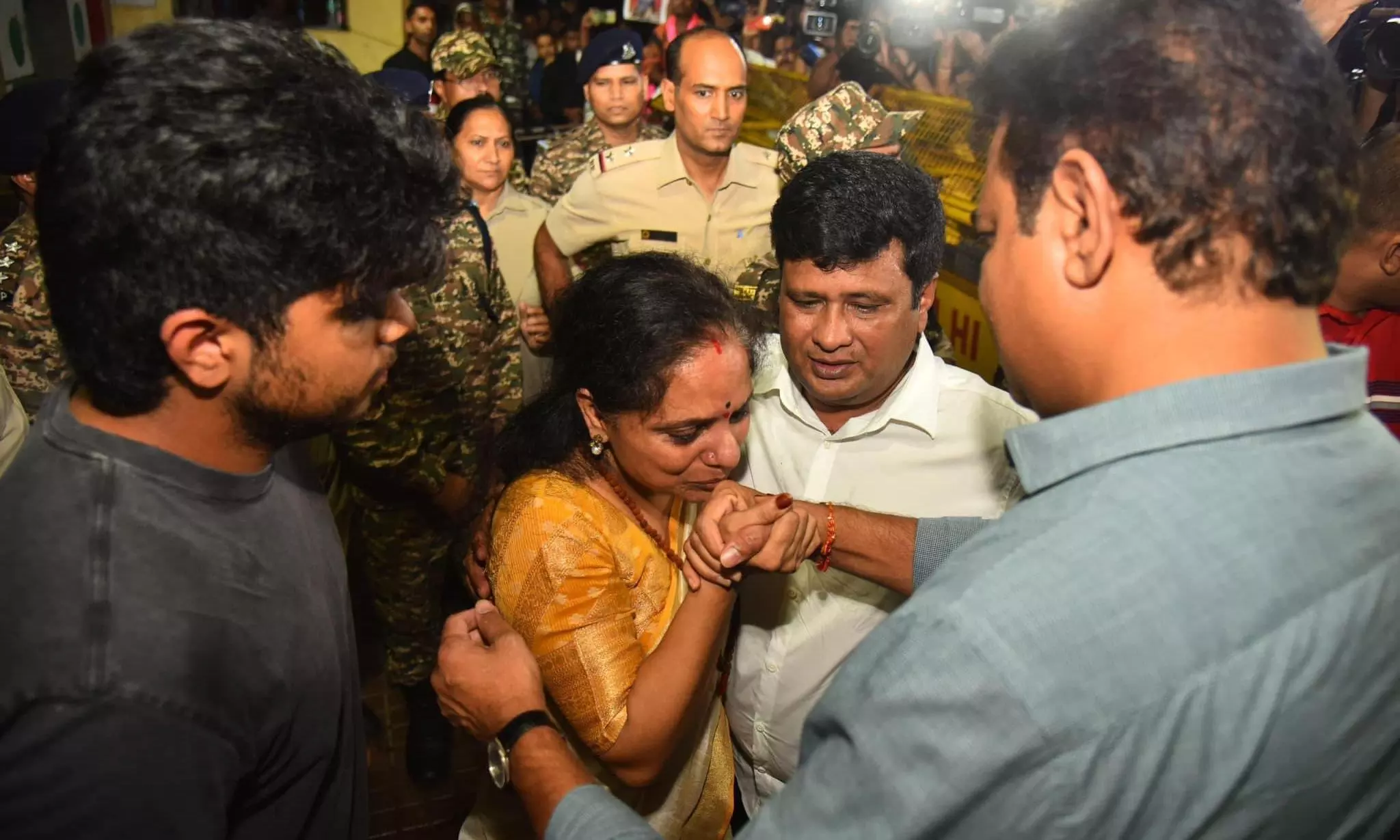Kavitha Out on Bail, Vows Payback to Those Who Put Her in Prison

Hyderabad: BRS MLC K. Kavitha, the daughter of former chief minister K. Chandrashekar Rao, on Tuesday secured a bail from the Supreme Court in the Delhi liquor policy scam case and was released from the Tihar jail, where she was housed for 165 days, after her arrest in the case in Hyderabad on March 15 this year.
News of her receiving bail was received with jubilation by BRS leaders and cadre. Kavitha’s brother and BRS working president K.T. Rama Rao, accompanied by senior BRS leader T. Harish Rao, and several party legislators had camped in Delhi since Monday.
Kavitha is expected to return to Hyderabad from Delhi on Wednesday afternoon, accompanied by Rama Rao, Harish Rao, and other BRS leaders.
Soon after stepping out of prison, a defiant Kavitha declared that her resolve to fight and prove her innocence in the case had become stronger after her incarceration.
In brief comments to the waiting media outside Tihar Jail, Kavitha said, “I am a child of Telangana and KCR. By sending me to jail for political reasons, they have made the BRS and KCR unbreakable. Those who did this will get back what they deserve with interest.”
Her release was preceded by some political drama with the Congress and the BJP accusing each other of facilitating Kavitha’s bail, and the BRS slamming the two parties.
Soon after the news of the bail came out, Union minister of state for home and BJP leader Bandi Sanjay Kumar tweeted saying, “Congratulations to the Congress party and its advocates for securing bail for BRS MLC in the infamous liquor scam,” in a clear indication that the BRS and the Congress had all but joined hands.
Telangana Congress working president Mahesh Kumar Goud said Kavitha’s bail was a result of the BRS and BJP joining hands, and that Tuesday’s outcome in the court was on the expected lines.
Rama Rao hit back first accusing Sanjay Kumar of “casting aspersions on the Supreme Court” and claiming that his comments were “unbecoming” of his position. Rama Rao urged the Chief Justice of India and the Supreme Court “to take cognisance of these comments and initiate contempt proceedings.”
Earlier in the day, the Supreme Court issued a regular bail to her with conditions. A division bench comprising Justice B.R. Gavai, and Justice K.V. Vishwanathan, heard Kavitha`s separate petitions challenging the Delhi High Court orders in rejecting her bail petitions in the cases registered by CBI and ED against her on charges of her involvement and money laundering in the liquor policy scam case.
The Bench allowed both petitions and quashed the Delhi High Court orders. Permitting bail, the Supreme Court directed Kavitha to furnish personal bonds of `10 lakh each in both FIRs before the trial court.
The court asked Kavitha to deposit her passport before the trial court and that she should not attempt to influence or intimidate the witnesses and not tamper with the evidence. She has to attend regularly before the trial court and to cooperate with the expeditious disposal of the trial.
The Supreme Court criticised the CBI and ED for their alleged selective approach in making some persons as accused and treating some of accused as approvers. The apex court bench questioned the fairness of the prosecuting agencies.
"Prosecution has to be fair. A person who incriminates himself has been made a witness! Tomorrow you pick up anyone as you please? You cannot pick and choose any accused. What is this fairness? Very fair and reasonable discretion!!" Justice Gavai observed.
The apex court also faulted the Delhi High Court observations while rejecting Kavitha’s bail petitions and denying to consider her bail under provisions of Section 45 (1) of the Prevention of Money Laundering Act. The provision would entitle the woman in special consideration in PMLA cases.
However, the Delhi High Court was not inclined to apply the provision to Kavitha on the ground that she was not a vulnerable woman and observed that she was an educated, sophisticated woman not entitled to bail under the beneficiary provision for women under PMLA.
The apex court observed that the High Court`s observation was nothing but discrimination between ordinary women and an MP.

